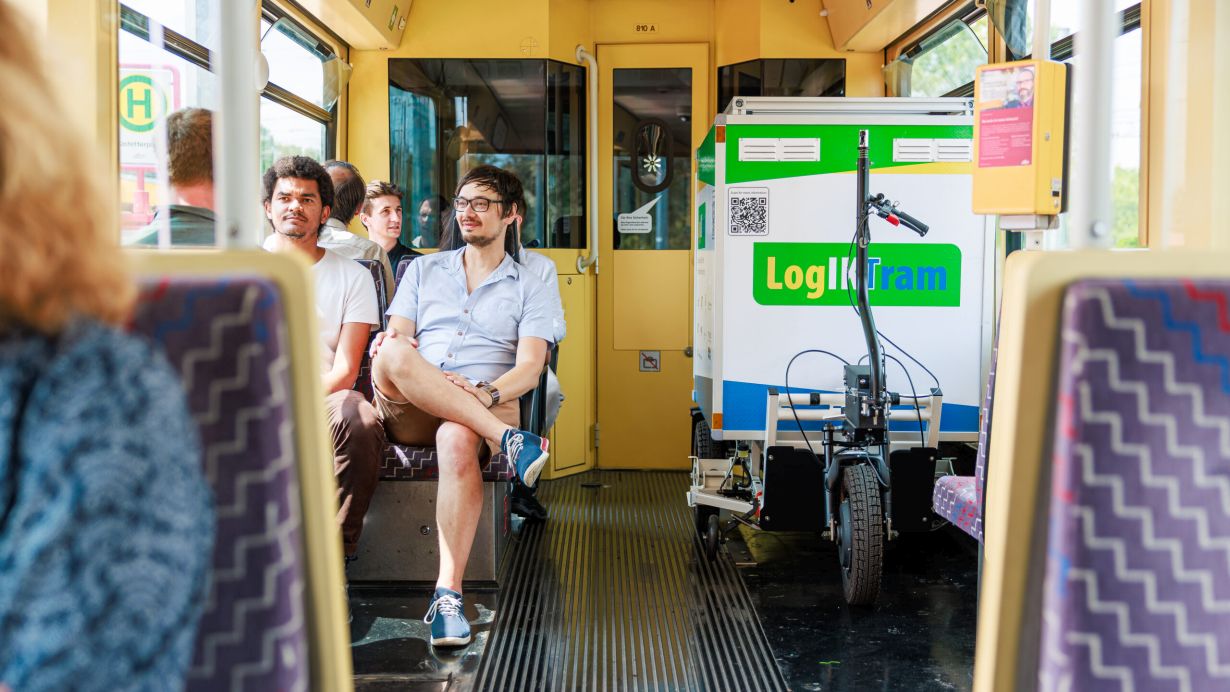In the LogIKTram project, Karlsruhe Institute of Technology (KIT), Albtal-Verkehrs-Gesellschaft (AVG), FZI Research Centre for Information Technology, an innovation partner of KIT, and further partners have developed a logistics concept to shift more freight transport from roads to rails. KIT researchers have analysed the technical conversion of a railway vehicle as well as the effects on traffic. At the project’s closing event (28 June 2024), the team presented a converted AVG light rail system, which was constructed on the basis of the two-system light rail system used in Karlsruhe and can be used as a freight tram for a climate-friendly parcel service in the future.
In the joint LogIKTram project, the scientists studied how future freight transport can be shifted to tram and light rail vehicles in order to relieve urban and regional road traffic. They developed a technical concept for a freight tram for local public transport on the basis of a two-system light rail system based on the "Karlsruhe model". The Karlsruhe model has been combining tram lines in the city and railway lines in the surrounding area for almost 30 years. As part of the project, AVG provided the researchers with an older vehicle, which they adapted to the project requirements and tested as a demonstration vehicle.
Demonstration of a Freight Tram for Karlsruhe
At the closing event, the project team presented the converted light rail vehicle and demonstrated that it integrates smoothly into the AVG's rail-based public transport network as a freight tram: An electrically assisted bicycle trailer travelled independently to the designated area of the tram to be transported from there to the delivery area. In future, parcels could be picked up at a stop by a bicycle courier, for example.
Interior Design and Simulation
"We took on the interior design of the freight tram and, for example, looked at the automated loading and unloading of the transport containers as well as securing them in the train. We also looked into the positioning of the trams at the stations, as this is important in order to move the transport containers with centimetre precision and to comply with the normal passenger changeover times in passenger transport," says Dr Michael Frey from the Institute of Vehicle System Technology at KIT. Also, the effects of the freight train concept on road and rail transport were studied by scientists of the Institute for Transport Studies (IfV) at KIT. "With the help of the mobiTopp transport demand model developed at IfV and its logistical extension logiTopp, we set up a simulation environment for passenger and freight transport in the Karlsruhe model region and used it as a basis to analyse various freight train operating scenarios and their effects on traffic," explains Lukas Barthelmes from IfV at KIT.
Climate-Friendly Transport System for Increasing Parcel Traffic
"Our simulations show that the LogIKTram concept contributes to a shift from conventional journeys on the road to the tram and then to the cargo bike and can therefore reduce the volume of motorised traffic," says Barthelmes. The prerequisite for this is the establishment of central hubs in the city, from which cargo bike tours can be pooled, as well as the efficient connection of the surrounding distribution centres of logistics service providers to the tram system. "We can assume that parcel traffic will continue to increase in the future. Freight trams could help to cushion the increase in parcel traffic with a sustainable transport concept for the urban and regional supply of private households and companies," says Barthelmes.
LogIKTram is part of the overall regioKArgo initiative, in which the partners will research and implement new forms of cross-modal goods transport and delivery traffic. The project started on 1 March 2021 and was scheduled to run for three years. LogIKTram received a total funding of around 2.75 million euros from the Federal Ministry for Economic Affairs and Climate Action. Albtal-Verkehrs-Gesellschaft mbH coordinated the project. In addition to KIT and FZI, the project partners were Offenburg University of Applied Sciences, INIT GmbH, Marlo Consultants GmbH, SimPlan AG, DB Engineering & Consulting GmbH, Verkehrsbetriebe Karlsruhe GmbH and Hitachi. Other associated partners include Dachser, DPD, UPS, Nüwiel and the City of Karlsruhe as well as the network partners AEN - Automotive Engineering Network, e-mobil BW GmbH and TechnologieRegion Karlsruhe GmbH.
Details about the KIT Centre for Mobility Systems
Being “The Research University in the Helmholtz Association”, KIT creates and imparts knowledge for the society and the environment. It is the objective to make significant contributions to the global challenges in the fields of energy, mobility, and information. For this, about 10,000 employees cooperate in a broad range of disciplines in natural sciences, engineering sciences, economics, and the humanities and social sciences. KIT prepares its 22,800 students for responsible tasks in society, industry, and science by offering research-based study programs. Innovation efforts at KIT build a bridge between important scientific findings and their application for the benefit of society, economic prosperity, and the preservation of our natural basis of life. KIT is one of the German universities of excellence.

